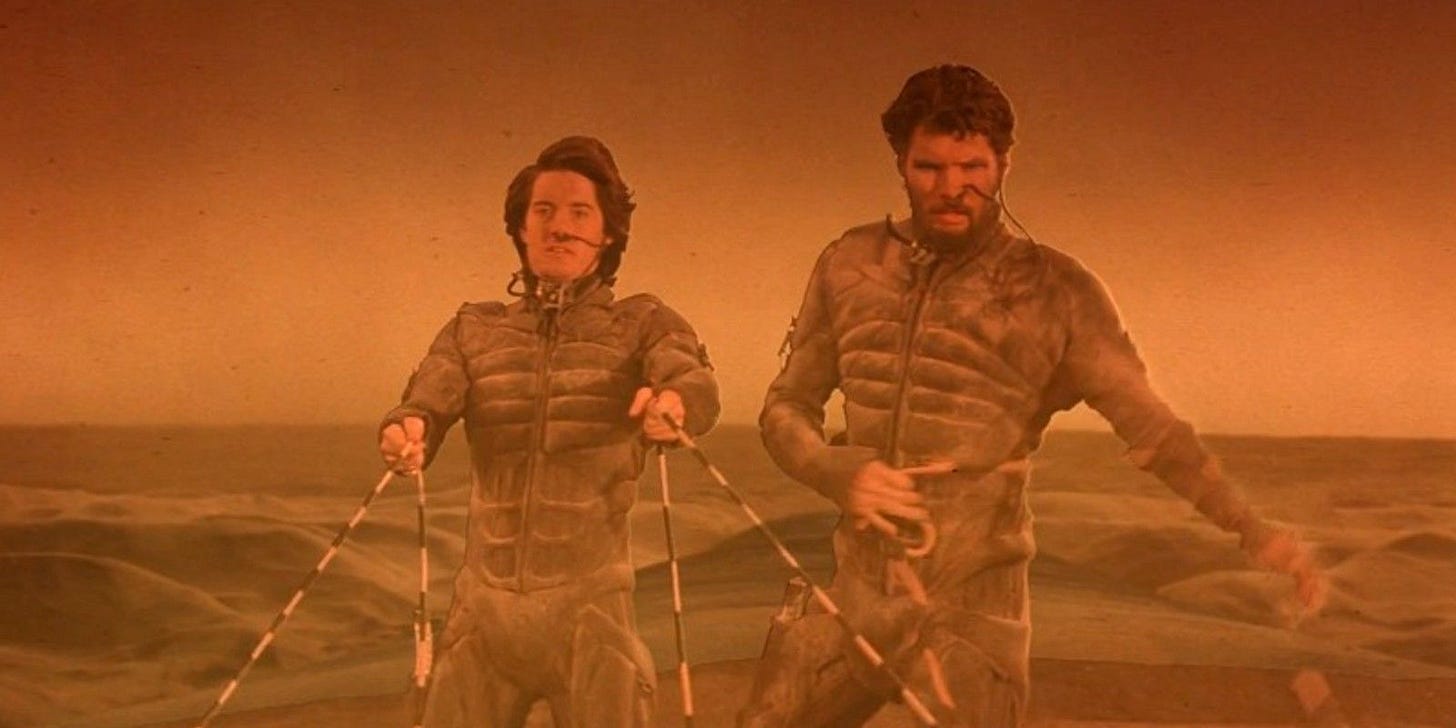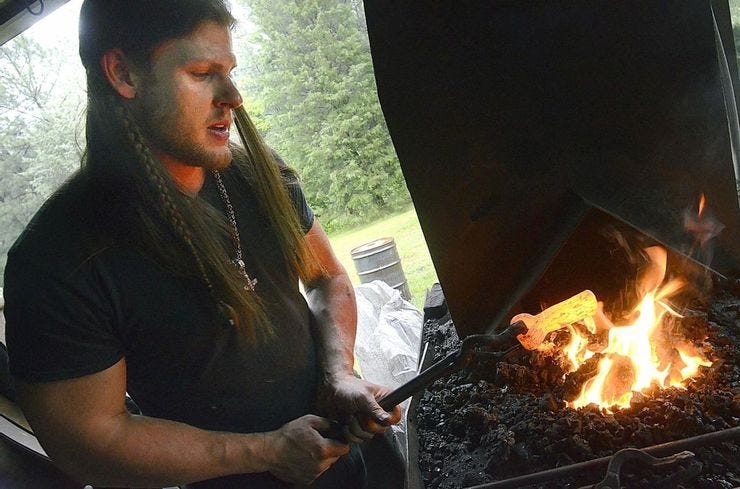
Wow it’s hard to believe a whole year has passed. Such an overwhelming experience, so many ups and downs, tragedy and triumph. That’s right, it’s been a year of reading Frank Herbert’s Dune. And now I have finished. I’m only joking of course it only took me like 8 months, and I took a break for a couple of months in there. So I know there are people out there who pick up Dune and tear through it and it immediately becomes their favorite book, and I think a lot of people even read it when they were kids, which is wild to me. And I am definitely glad I read it and it was long overdue, but I don’t know, I found it to be a dense and sometimes frustrating book.
(HUGE SPOILERS ahead, but let’s be honest you’re probably not going to read it so just keep going.)
I also find it almost impossible to say whether I actually liked Dune or not, although if one measure of a book is how much you think about it after reading, it has definitely delivered. That’s because the strength of Dune as science fiction, and why many consider that it was a kind of turning point for the genre when it published in 1965, is that it is much more about grim societal critique and competing philosophies than the 1950s yarns of scientific imagination. In particular, Herbert’s book is fixated on the interplay of belief systems and power structures, especially how they are subverted, toppled, and replaced, often to bloody ends.
If that sounds like not great fodder for a Hollywood blockbuster, well, I would actually agree with you, even though I will most definitely and eagerly watch the new movie(s). But I have come to the conclusion that, although it has lots of cool outfits and giant sandworms and a box of pain, it is really not very good source material for a movie. That’s evidenced by the 1984 David Lynch movie that everyone knows is really bad but come on we all love it be honest.

Roger Ebert famously called it “a real mess ... incomprehensible” but to be fair, that’s also kind of what the book is like too. Aside from being heavily steeped in Dune’s many tropes from a young age, part of why it’s so hard for me to rate as a work of literature is that it is a book just jam packed, bursting at the seams with characters, concepts, plot points constantly being picked up and put down, with seemingly every thought that every character has put to page, word for word. My dear friends and family members Josh and Theresa recently told me about when they got regrettably roped into playing the notorious Dune board game, and as Josh described it:
It’s a super complicated asymmetric combat game where every faction not only has totally different rules and goals, but everybody has a secret traitor in somebody else’s team that they get to reveal at some point AND there’s both a sandstorm that rotates around the board on top of shai huluds [sandworms] popping up randomly.
Again, that’s a pretty accurate reflection of the book. Which means basically any attempt to make a popular, mainstream adaptation has no choice but to completely flatten the story, or hopelessly pick and choose which elements to focus on. Some say that’s actually why Dune the book is so enduring. It is so loaded with ideas that it seems to mean something different to everyone who reads it. As Emmet Asher-Perrin writes:
Dune is so complex, so layered as a piece of literature that it is impossible to isolate one aspect that is responsible for its successes. That makes the series, particularly the premiere novel, a difficult one to discuss casually—everyone draws something from it that is unique to their own reading. Everyone has a specific draw, key-in character, academic interest that the story fulfills for them.
For that reason, though an extremely political book, it similarly does not map easily onto modern political ideologies and conflicts. Herbert himself was a baffling figure, politically and culturally. He spent much of his youth in a socialist commune in Washington, and was practically raised by a member of the Hoh tribe. Herbert’s closest friend as an adult was Quileute elder Howard Hansen, who even gave him the idea for Dune. Herbert was a naturalist and conservationist, became a Zen Buddhist, tripped on peyote in the wilds of the Pacific Northwest. But at times he also campaigned for Republican politicians, hated government, railed against the Soviet Union, and was possibly a huge homophobe.
On that note, it must be said that, like so many early sci-fi works, Dune has problematic elements. It is hard to view the portrayal of Baron Vladimir Harkonnen as anything but homophobic. It’s also, at its core, a white savior story, a la Dances With Wolves or Lawrence of Arabia or Game of Thrones, in which Paul Atreides, a stand in for Western society, lives among an indigenous people the Fremen, who are a kind of composite of Arab cultures. Paul, who is for some reason the best person at everything, is eventually worshipped by the Fremen and leads them to take over the universe.
But again, it’s complicated. Dune’s world is patriarchal, but in some respects very feminist. Lady Jessica, Paul’s mother, is in fact maybe the most well-developed and the only really sympathetic character. Herbert writes beautifully about the desert and ecology, and humanity’s place in it. The book is punctuated with these thought-provoking zen koans. While some take offense at Herbert’s use of Islam and Sufism, others find it a surprisingly nuanced representation. “Herbert’s Islam was…great, capacious, and often contradictory discourse. … Herbert understood that religions do not act. People act. Their religions change like their languages, slowly over time in response to the new challenges of time and place,” writes Islamic studies scholar Ali Karjoo-Ravary. He praises Herbert’s use of the term jihad as more dynamic than its usual Western “holy war” connotation:
…at root, it means to struggle or exert oneself. It can take many forms: internally against one’s own evil, externally against oppression, or even intellectually in the search for beneficial knowledge. … Herbert’s nuanced understanding of jihad shows in his narrative. He did not aim to present jihad as simply a “bad” or “good” thing. Instead, he uses it to show how the messianic impulse, together with the apocalyptic violence that sometimes accompanies it, changes the world in uncontrollable and unpredictable ways.
That nuance of ideas is probably Herbert’s and Dune’s greatest offering, and what I think makes it successful as sci-fi. Good science fiction allows us to poke at the edges of our most challenging and radioactive problems and try out worlds different than our own, for better and worse. Similar to another political genre classic, Alan Moore’s Watchmen, the characters’ belief systems vary widely and none of them are all that great. (Although, as with Watchmen, fascists have latched onto certain aspects of Dune as affirmation of their beliefs.) Most ideologies in Dune manifest in both benevolent and malignant forms. Dune is as suspicious of religion as it is of mysticism, as it is of science, as it is of corporations, as it is of government.
In that sense, I can see an anarchist reading of Dune. It’s hard to know what Herbert personally believed at the time he wrote the book, but one thing he clearly disliked were power structures. On one level, this is a book all about oppressive hierarchies. The villainous empire in the novel is a galactic government that is a hybrid of feudalism and the military industrial complex, fueled by a substance extracted from an oppressed planet that allows the galaxy’s elite to travel through space, all of which may sound faintly familiar to some of you.
But just as Herbert tears down power structures, he also warns of the danger of absolute control within revolutions, especially in the hands of a Messianic figure. This becomes the final lesson of the novel during a heel turn in which Paul, shattered by the murder of his infant son, knowingly goes down a path of mass murder to get revenge (did I mention Paul can see into the future Paul can do all kinds of stuff). He weaponizes multiple religions, the Fremen people, actual nuclear weapons, and the patriarchal monarchy in order to basically conquer the universe. In the sequels (I googled it), Paul’s reign as emperor kills 60 billion people. See you at the movies!
So kind of a dark turn there, but just as there are no inherently good belief systems in the world of Dune, there are also no good outcomes for its characters. It’s all a big lose-lose. But they have to live with some outcome, and the tragedy is that Paul knowingly chooses one of violence and domination, despite initially being driven by love of his community and his family. “He felt emptied, a shell without emotions. Everything he touched brought death and grief. And it was like a disease that could spread across the universe.”
I’m betting there’s a lot of debate about the extent to which Paul is an agent of free will, but as I read it, he could have chosen differently. He knows that even though there are powerful forces that guide us, we can set the rules that shape society. Before his son dies and he goes full goth Paul, there’s this hopeful moment that stuck out to me, when he convinces the Fremen to eliminate trial by combat as the way leaders take control. He stands before the Fremen, who insist that this is the way it’s always been, that “Hard tasks need hard ways.” Paul responds, “Ways change.” But not always for the better, he will learn.
Dune is not a book about climate change, but it is a book about the structures that control resources. It’s also a book about transition and transformation. As powerful as the feudal government and the corporation that control the universe appear, currents shift, shai huluds surface, sandstorms emerge, and ways change. Sometimes we can steer these forces, sometimes we are steered by them, but systems are overturned in radical ways. One concern in climate discourse that I’ve been increasingly hearing is that our system of government may simply not be equipped to meet the challenge of climate change. Too beholden to profit, too structurally conservative, too slow-moving and self-moderating for the kind of rapid transformation needed. That’s a scary thought, both the possibility that our current system could simply fall short, and the thought that it needs to be radically overhauled in order to survive.
What that means exactly is up for grabs. For some, it starts with rules changes like eliminating the filibuster. Political scientist Hélène Landemore envisions the next evolution of democracy as one of more direct participation, leadership by the masses rather than electoral representation, a feature that has perhaps hit a wall. David Wallace-Wells explores different possibilities in The Uninhabited Earth, through the work of Geoff Mann and Joel Wainwright. “If neoliberalism is the god that failed on climate change, what juvenile gods will it spawn?” he asks. Mann and Wainwright pose a “climate leviathan,” in which “capitalism overruns the world’s borders to address the planetary crisis while protecting its own interests,” along with the possibilities of one climate world government, climate dictatorships, a protection racket via climate mafia boss.
Around the middle of Dune, Paul is doing his future gazing thing, but it doesn’t always work that great. He often sees the many threads of possibility but the outcome is fuzzy, “a boiling of possibilities focused here, wherein the most minute action—the wink of an eye, a careless word, a misplaced grain of sand—moved a gigantic lever across the known universe. He saw violence with the outcome subject to so many variables that his slightest movement created vast shiftings in the pattern.” None of us has the singular power of the Kwisatz Haderach (Paul has like 10 different names it’s so annoying), but it does feel like we are living in a boiling of possibilities. That’s a frightening, overwhelming thought. One lesson from this 1965 book about giant worms is that you can indeed change the world, but you can’t take it for granted that the outcome will be better than before.
Links
The racist attack in Atlanta was only the latest in a year of heightened racism against Asian Americans. Stop AAPI Hate documented nearly 3,800 racially motivated attacks against Asian Americans in the past year.
“Your grief is your grief. You can’t compare it to other people’s.” Disenfranchised grief is that which isn’t acknowledged or supported by social ritual, something many people have experienced during COVID.
The collaborative effort to save the Saguaro.
Looking at party platforms, researchers found Democrats’ support for economic equality and social assistance programs plunged from 1984 to 1996, then steadily climbed and reached a new high in 2020.
The looming wave of evictions is a policy choice, not an inevitability.
Ugandan activist Vanessa Nakate says organizers of a climate conference tried to censor her speech because it criticized world leaders for inaction.
Nuclear power will be around for some time, but has drawn little interest as a major path to decarbonization, in part due to huge geopolitical baggage. “The technology used to turn on lights or charge mobile phones shouldn’t need to involve national or international defence apparatus.”
Liberals who sang the praises of JD Vance in 2017, please step forward and apologize.
Massachusetts started out in February with an F grade on its vaccine rollout, but is now up to a B.
Since COVID hit, some cities are cutting back on excessive zoning and permitting rules for small businesses.
Online mobs are carrying out sustained harassment campaigns against women journalists. (Critics of “cancel culture” are mysteriously unconcerned.)
Cities are turning confederate monuments into public spaces that promote healing. My favorite part of this article is how to get around a state law blocking cities from removing monuments, Memphis sold two parks to a nonprofit for a dollar each and tore down their monuments immediately. 🤝
Watching
I’ve known for a long time that if I ever had a mid-life crisis it would have to do with knives and other bladed tools, and my rate of purchases has indeed been on an upward trend. I don’t know why exactly. But we’ve been watching this show called Forged in Fire, which is a truly ridiculous bladesmithing competition. Part of the fun of it is you get to see a rare cross-section of American masculinity (it’s almost always men, it’s an issue), united by their love of leather necklaces, kilts, creative beards, and of course, knives. Also, sometimes people pass out and go to the hospital during the competition.
Listening
Continuing the theme of embarrassing interests, right after college I had a cringey period where I grew out my hair RIP, smoked a lot of pot, and played frisbee golf at least once but usually twice a week. I also listened to a lot of late 60s rock in that time, and one band that stuck, which baffles almost everyone I mention it to, is Jethro Tull. Haters gonna hate.
Reading
I’m about to wrap up poet Patricia Lockwood’s No One Is Talking About This, her first novel, which is about an extremely online main character who became famous worldwide for tweeting “Can a dog be twins?” If you spend a lot of time jacked into cyberspace this book will resonate, but beyond that it is a masterful satire of the complete fucking absurdity of modern life. I think it’s the best thing I’ve ever read about the internet. As in her poetry and her twitter account, Lockwood is staggeringly clever which is counterbalanced by her weirdness and savage criticism of everything from pro-life dads to the dirtbag left. One of a kind book, highly recommend.
“In contrast with her generation, which had spent most of its time online learning to code so that it could add crude butterfly animations to the backgrounds of its weblogs, the generation immediately following had spent most of its time online making incredibly bigoted jokes in order to laugh at the idiots who were stupid enough to think they meant it. Except after a while they did mean it, and then somehow at the end of it they were Nazis. Was this always how it happened?”
…
Already it was becoming impossible to explain things she had done even the year before, why she had spent hypnotized hours of her life, say, photoshopping bags of frozen peas into pictures of historical atrocities, posting OH YES HUNNY in response to old images of Stalin, why whenever she liked anything especially, she said she was going to “chug it with her ass.” Already it was impossible to explain these things.
There’s my Dune hot take issue, I hope you enjoyed it. I only read the one book and haven’t seen any of the shows or anything so if you have some good Dune takes or counter-takes I would love to hear them. I guess I sort of think of this issue of Crisis Palace as my own version of Dune. Complicated, messy, too long, unsatisfying ending. But the world building—unmatched.
For you, I hope this newsletter is like the precious spice, the water of life, in that it allows you to peer through time and space with heightened awareness. And it is highly addictive. And it turns your eyes blue and smells like cinnamon. Please enjoy next week’s newsletter Crisis Palace Messiah, then Children of Crisis Palace, and Heretics of Crisis Palace.
Fear is the mind killer,
Tate



